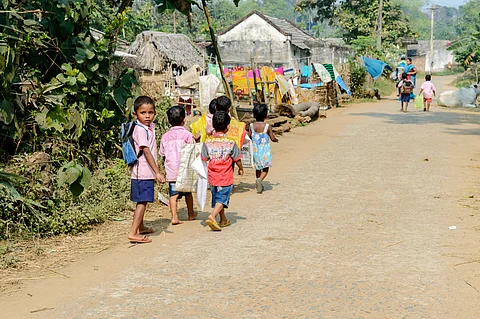

Climate change directly impacts education. A new report by the Global Education Monitoring Report of United Nations Educational, Scientific and Cultural Organization has highlighted the long-term impact of climate shocks experienced in early childhood.
The paper, part of a series aimed at fostering dialogue on education and the UN-mandated Sustainable Development Goals (SDGs), raises concerns about the lasting damage extreme weather events can inflict on a child’s development.
The first paper in the series, published in partnership with the Monitoring and Evaluating Climate Communication and Education (MECCE Project), focused on climate change. According to Education and climate change: Learning to act for people and planet, climate related stressors, such as heat, wildfires, storms, floods, droughts, diseases and rising sea levels, affect education outcomes.
The report emphasised the vulnerability of young children. Their reliance on adults and developing bodies make them more vulnerable to the immediate physical hazards of floods, droughts, and heatwaves. However, the impact extends beyond the physical. According to the report, these experiences can have a negative impact on a child’s cognitive abilities, emotional well-being, and educational opportunities.
Children in Ecuador who were exposed to severe El Nino floods while in utero were shorter and performed worse on cognitive tests five to seven years later. A study of rainfall shocks in utero during the first 15 years of life in India discovered that they had a negative impact on vocabulary at age 5, as well as mathematics and non-cognitive abilities at age 15.
An analysis of disasters experienced early in life by over 140,000 children in seven Asian countries discovered a negative relationship between school enrollment, particularly for boys, and mathematics performance, particularly for girls, by the age of 13 to 14.
Most low and middle-income countries are experiencing climate-related school closures every year, increasing chances of learning loss and dropout, the report stated.
At least 75 per cent of extreme weather events have resulted in school closures over the last 20 years.
Natural disasters, such as floods and cyclones, are becoming more common, claiming the lives of students and teachers while causing significant damage and destruction to schools.
Following the 2013 Jakarta floods, access to schools was disrupted, schools were converted into emergency shelters, and some schools were closed due to damage.
Flood exposure reduced the number of completed grades among 12- to 15-year-olds in Ethiopia (3.4 per cent), India (3.8 per cent) and Vietnam (1.8 per cent), owing to household income loss.
Cyclone Idai destroyed 3,400 classrooms in Mozambique in 2019, denying 305,000 children access to education.
Tropical Cyclone Gita damaged 72 per cent of Tonga’s schools in 2018.
According to the report, heat has a significant negative impact on children's educational outcomes. An analysis of census and climate data from 29 countries between 1969 and 2012 found that exposure to higher-than-average temperatures during prenatal and early life is associated with fewer years of schooling, particularly in Southeast Asia.
High temperatures reduced high-stakes test performance in China, resulting in lower high school graduation and college entrance rates.
Rain variability can also have a negative impact on educational outcomes. According to a study of the 2010 flood's impact on educational outcomes in Pakistan, children and adolescents in flooded districts were 4 per cent less likely to attend school than peers in non-flooded districts.
An analysis of Demographic and Health Survey data from ten African countries reveals that abnormally low precipitation has a negative impact on primary school completion. Six months of cumulative exposure to low precipitation and drought-like conditions reduced completion rates by 6.4 per cent.
Drought reduced children's mathematics and reading scores in rural Maharashtra, India by 4.1 per cent and 2.7 per cent, respectively.
The report emphasised the importance of including climate change education in school curricula. This integration should not only provide climate science knowledge, but also skills in resilience, adaptation and sustainable development.
To alleviate these effects, proactive measures are required. This includes strengthening school buildings to withstand climate impacts, training educators to support students psychologically and academically during these challenges, and fostering community resilience through awareness and adaptation initiatives.
The report advocated for greater investment in educational systems to strengthen their resilience to climate-related disruptions.